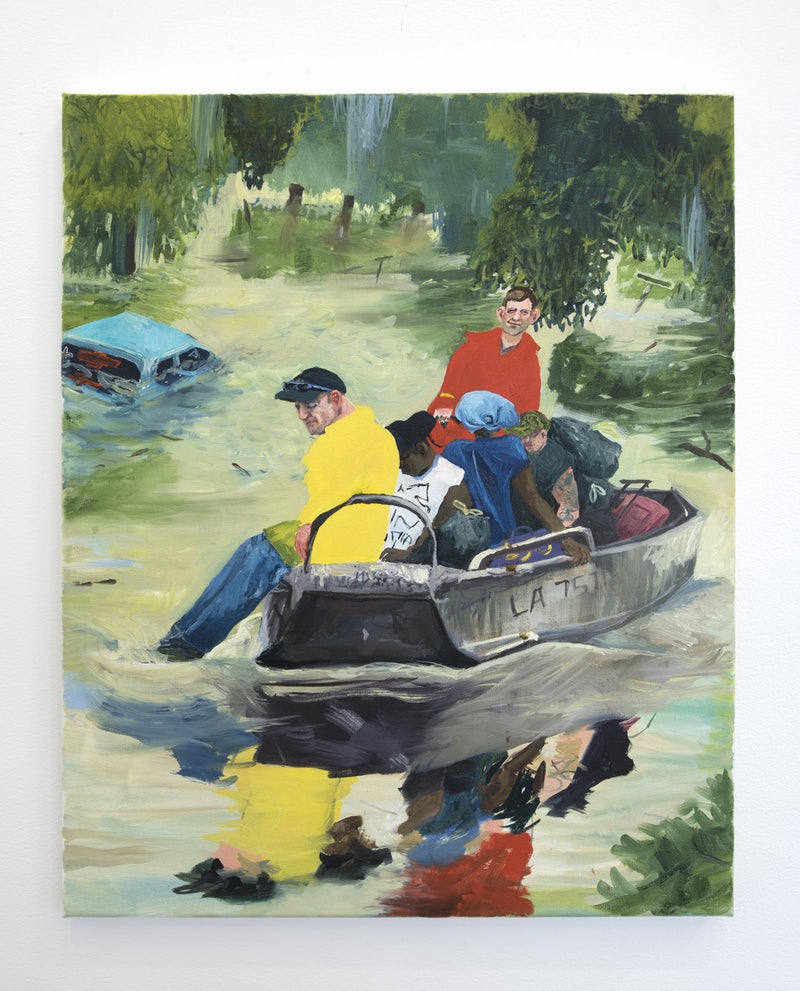Click the link below to get closer to Celeste Dupuy-Spencer’s epic painting of the January 6th insurrection at the Capitol, Don’t You See That I Am Burning.

https://www.miergallery.com/exhibitions/celeste-dupuy-spencer3/videos
A Website of the Radical Imagination
Click the link below to get closer to Celeste Dupuy-Spencer’s epic painting of the January 6th insurrection at the Capitol, Don’t You See That I Am Burning.

https://www.miergallery.com/exhibitions/celeste-dupuy-spencer3/videos
Prose by Zalokar (AKA David Golding) (x2), Bob Levin, Richard Meltzer, Aram Saroyan, and Theodore Putala prompted by Jack Kerouac’s Big Sur and the documentary, One Fast Move or I’m Gone, about the stretch in Kerouac’s life chronicled in that novel. You can watch One Fast Move for free online here. (H/t Theodore Putala.)
Comic Conner O’Malley caught the MAGA moment on the wing a few years ago in a series of Vines (collected here). In these six-second shots: “O’Malley — playing a deranged car-and-wealth-obsessed man — would pull up to befuddled Manhattan businessmen in sports cars, scream guttural praise for their public display of opulence, and then bike away before they knew what hit them.”
Thanksgiving was Joel DeMott’s first movie. It was screened at Tom DeMott’s Memorial on Dec. 1 (nearly 50 years after she made it). Tommy–Jo’s first roommate/fan–would be beaming now if he revisited her visions of him and the DeMott fam. Click on “Read More” to watch Thanksgiving. Use the following password: Amherst
“There ain’t gonna be no last time!!…”
The late Abbas Kiarostami’s Like Falling in Love (2012) was originally titled “The End,” which would’ve underscored the final scene’s go-to-smash upending of viewers’ presumptions. The film, set in Japan, works like a gently penetrative Ozu-y character study until it’s transformed utterly by a sudden act of violence in the last second(s).
Solomon Burke cut “Sidewalks, Fences and Walls” long after he sang songs that made him “King of Rock and Soul” in the 60s. There’s a good cover by Bob Dylan (on a bootleg) which steered your editor to the original. Other Firsters had already heard and loved it. More from one of them below…
“What man isn’t a Solomon to some missing-Mary in his life?
I can’t fucking believe she married Billy. Billy!”
Hockney’s pictures have been derided as “merely decorative” and the late Peter Fuller takes up that criticism with the artist in the short clip posted below. Hockney’s musings link pleasure in his art to affirmations of his (gay) self: “We should like ourselves.” There’s another BBC program where the artist is sound-tracked by snatches from Stravinksy’s opera, “The Rake’s Progress,” which flashed your editor back to an 80s Hockney show that seemed largely about cruising. (Not that Hockney’s phenomenology of his intentional body in space is always so libidinal.) While gay liberation is on his canvasses, the splashy promesse de bonheure in Hockney’s art belongs to everybody everybody. It’s a 60s thing, though it evokes other avatars of happiness that deserve dap–Greeks who first depicted the human smile, young French revolutionaries who declared: “happiness is the new idea in Europe,” ex-West Africans who flipped the mask of tragedy even as their favorite color reminded them of their lost continent. It’s all about blue for Hockney too!
If you’re around New York, go see his show at the Met before it closes on February 25th. B.D.
Celeste Dupuy-Spencer has been painting up a storm. The artist told art blogger Brienne Walsh she usually takes 6 months to a year and a half to finish a picture but for “Wild and Blue,” her first solo show in New York (which runs until October 7th at the Marlborough Contemporary Gallery), she only had the summer and the “paintings just got ripped out of me.” More than a few of her pictures hint at hurricane weather. And Dupuy-Spencer, who’s lived in New Orleans (though she’s based in L.A. now), knows from floods of feeling. Pictures like Cajun Navy and Lake Pontchartrain look back to Katrina’s aftermath but are all up in this time of climate change.

 Dupuy-Spencer is “painting the news” as one reviewer has written in New Republic, citing her picture of the Confederate monument torn down last month in Durham, which “amounts to a kind of monument to the search for social justice.”
Dupuy-Spencer is “painting the news” as one reviewer has written in New Republic, citing her picture of the Confederate monument torn down last month in Durham, which “amounts to a kind of monument to the search for social justice.”
The kind of fundamentalist school I went to churns out two kinds of individuals: super-Christians—with gleaming smiles surgically implanted on their faces—and drug addicts. I’m exaggerating, of course, but only slightly.
Un village français, a French television serial, was first broadcast on France 3 in 2009; the channel began showing the serial’s seventh and final season in October of 2016, and at the end of its run sixty-six episodes had been broadcast. Around the time it first appeared a Francophone friend recommended it as startlingly good TV, but warned that subtitled versions other than one season with French subtitles had proved impossible to locate. The belated appearance of a version subtitled in English is a very welcome gift. Along with the policier Engrenages, which stars several of the same actors, Un village français made even malevolent foreigners concede that French TV, under de Gaulle sometimes pilloried as a medium specializing in documentaries about beehives, had no reason to fear comparison to any televisual culture in the world.
Bob Dylan’s nod in his Nobel prize acceptance speech to Shakespeare was in tune with Charles O’Brien’s musing on the dailiness of genius in his pre-millennial take-down of George Steiner (which is posted below).
I know I just dropped too many names on you, but please allow me to introduce one more. I was reminded of O’Brien’s music again recently when I came across a Steiner quote in the introduction to a reprint of an early work by the Marxist polymath Max Raphael. The intro’s author cited this bit of Steiner in wannabe mandarin mode–”not only the humanities, but humane and critical intelligence itself resides in the always threatened keeping of the very few”–to sum up assumptions about Mind that Raphael instinctively resisted. Like Raphael back in the day, O’Brien has always been repelled by the yen to equate humanism with prerogatives of “traditionally delimited professional circles.”

On my way to Andre Techine’s Being Seventeen, I stopped by Patisserie Claude for savory take-out and felt nicely sated as I found my seat in the theater, but the film stoked other appetites. (We cannot live by quiche alone, not even Claude’s.) Techine’s french lessons sky beyond “grub-first, then ethics” materialism. His scenarios feed your head and your heart, tuning every organ to desire’s pitch. I sensed Being Seventeen would be one of Techine’s full body-and-soul workouts early on when Thomas (Corentin Fila)—lovesome, bi-racial bully-boy (who’ll end up taking it like a man once he beats his fear of being gay) humps it up the mountain, past where his adoptive parents have their farm. The snow looks freshly fallen—perhaps it’s not that frigid?—and his secret brook hasn’t frozen over yet. He strips and dives in…
Johnny Cash’s cover of “Sea of Heartbreak” fades out with the guitarist in his band (the Heartbreakers) locked on the familiar, insinuating riff from Bob Dylan’s “I Want You.”[1] Cash’s endgame mixes up his story of lost love with fanship. It’s a rootsy, Prousty lesson in counterpoint that hints what Dylan’s song owed to Don Gibson’s 1961 hit, even as it bows to what Cash’s old friend found down by the “Sea.”
Charles O’Brien helps launch the new First Choice section focusing on our writers’ favorite things.
“Twenty-Something” is the third track on Pet Shop Boys’ latest cd, Super. You can find it on YouTube in a few different versions. The two most obvious go-to versions are the “official video” and one remix. The “official video” is a b&w short about a gangbanger in San Diego, fresh out of the joint and trying desperately to adjust to the world. It’s about as efficient a short narrative as you’re likely to see, and as an illustration of these lyrics, not what you’d be likely to expect.